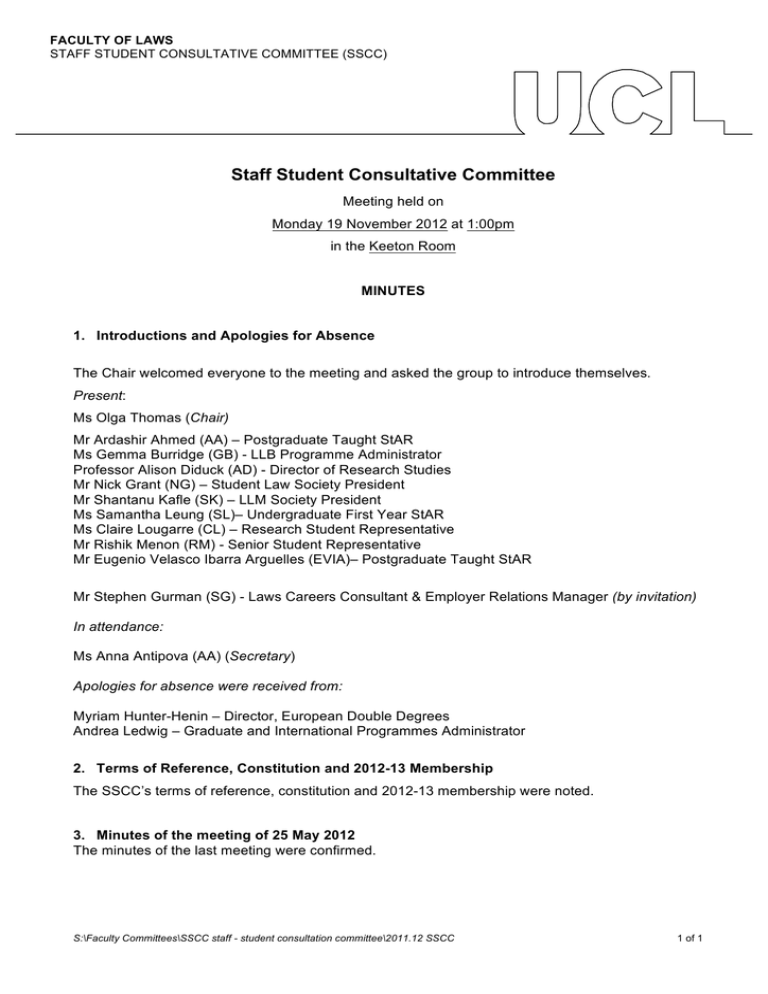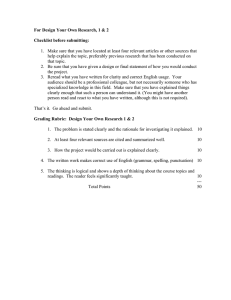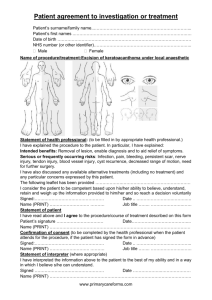Staff Student Consultative Committee
advertisement

FACULTY OF LAWS STAFF STUDENT CONSULTATIVE COMMITTEE (SSCC) Staff Student Consultative Committee Meeting held on Monday 19 November 2012 at 1:00pm in the Keeton Room MINUTES 1. Introductions and Apologies for Absence The Chair welcomed everyone to the meeting and asked the group to introduce themselves. Present: Ms Olga Thomas (Chair) Mr Ardashir Ahmed (AA) – Postgraduate Taught StAR Ms Gemma Burridge (GB) - LLB Programme Administrator Professor Alison Diduck (AD) - Director of Research Studies Mr Nick Grant (NG) – Student Law Society President Mr Shantanu Kafle (SK) – LLM Society President Ms Samantha Leung (SL)– Undergraduate First Year StAR Ms Claire Lougarre (CL) – Research Student Representative Mr Rishik Menon (RM) - Senior Student Representative Mr Eugenio Velasco Ibarra Arguelles (EVIA)– Postgraduate Taught StAR Mr Stephen Gurman (SG) - Laws Careers Consultant & Employer Relations Manager (by invitation) In attendance: Ms Anna Antipova (AA) (Secretary) Apologies for absence were received from: Myriam Hunter-Henin – Director, European Double Degrees Andrea Ledwig – Graduate and International Programmes Administrator 2. Terms of Reference, Constitution and 2012-13 Membership The SSCC’s terms of reference, constitution and 2012-13 membership were noted. 3. Minutes of the meeting of 25 May 2012 The minutes of the last meeting were confirmed. S:\Faculty Committees\SSCC staff - student consultation committee\2011.12 SSCC 1 of 1 4. Matters arising from the Minutes [see also items 12 and 13 below] 4.1 Academic Support / Student hours: OT raised Item 3.1 (Academic Support Feedback) and confirmed that the student hours list had been compiled and posted outside the Undergraduate, Postgraduate and Academic Services offices, in the student common room and on the student intranet. OT noted that whilst it has not been possible to achieve complete harmonization due to the differences in academic responsibilities, attempts have been made to standardise the process of meeting the tutors as far as possible. Most academic members of staff made themselves available for two hours a week subject to an advance contact by e-mail. 4.2 Higher Education Achievement Record (HEAR): OT drew the attention of the committee to Item 3.3 of the previous SSCC minutes. OT explained that the Faculty has received a report from the HEAR steering group following the submission of the list of 179 extra-curriculum activities undertaken within the Faculty. OT thanked the student body for assisting her in compiling the list and explained that not all activities were accepted by the HEAR Working Group. In particular, only winners of the competitions we run will have an entry on their transcript. Also, only six members of the Student Law Society Committee (President, Treasurer, Senior Moot Officer, Pro Bono Officer and Publications Officer) will be recorded. At the same time, OT reassured students that achievements not recorded on transcripts will be placed on student files and this information will then be used by the academic members of staff for writing references. 4.3 Laws Careers Consultant survey: OT raised Item 4.1 of the previous SSCC minutes. SG reported that he had circulated a survey in order to assess the student satisfaction with the provision of the one-to-one careers advice sessions within the Faculty. The response had been exceptionally positive. OT explained that the Faculty is committed to continue with this arrangement. 4.4 Annual Monitoring Report: OT raised Item 6 of the previous SSCC Minutes. OT reported that comments had been communicated to Professor Rob Chambers, the author of the report. 4.5 Jurisprudence Essay: OT drew the attention of the Committee to Item 7.1 of the previous SSCC Minutes. OT explained that she raised this issue with John Tasioulas, the course convenor. He explained that guidance on essay feedback had been given. 5. Chairperson’s business 5.1 UCL Volunteering Unit Report: OT reported that the data received from UCL Student Volunteering Unit (SVU) and circulated to the members of the SSCC indicated that law students recorded the highest level of participation in volunteering activities (13%) , an impressive achievement considering the demands of the law degree. OT congratulated all students on this significant achievement. ACTION POINT: OT to investigate which volunteering areas attracted most interest from law students and identify potential sources of help/support with these activities. 5.2 Teaching Equipment Fund: OT explained that the Faculty can apply for financial assistance with teaching equipment and other support materials by January 2013. OT explained that she would like to hear students’ opinion on what equipment can improve their learning experience and invited Student Representatives to email her and Matthew Grigson, the Faculty Manager (m.grigson@ucl.ac.uk) with their suggestions. 6. StARs Scheme OT checked whether all of those present were aware of the scheme. A positive response was received and noted. OT explained that the Student Union will run a number of different sessions for StARs throughout the year, that StARs will be invited to a special StARs graduation ceremony and that they will receive a certificate from the Dean of Student (Welfare). OT encouraged the Student Representatives to make the most of the scheme as it will help them develop various transferable skills and improve their employability. 7. Departmental Equal Opportunities Liaison Officer (DEOLO) OT informed the Committee of the network of 82 Equal Opportunity Officers across UCL. Colm O’Cinneide is the Equality Officer for the Faculty of Laws. He is responsible for advising the Faculty on the equal opportunity issues and providing individual guidance to the Faculty staff and students on what the university procedures are in relation to equality. OT explained that the Faculty’s Equal Opportunities Data will become available later in the term. ACTION POINT: For OT to present the Equal Opportunities Data to the SSCC when it becomes available. 8. Laws Careers Consultant and Employment Relations Manager Update OT invited SG to give an update on recent careers initiatives. SG identified the following key points: - - Launch of the new LLM Careers Programme. Excellent student feedback on one-to-one careers support within the Faculty. SG noted that the fact that he was based in one office this academic year led to a significant improvement in appointments procedure and uptake. UCL Law Fair 2012 proved to be highly successful and the student attendance was up by 10%. Niche Careers events, such as Paris Law firm presentation for students interested in a career in France received very positive feedback. Events around UCL are now advertised via a weekly Laws Careers Newsletter. This increased participation of the Laws students, particularly LLM students, in the UCL-wide careers presentations. In particular, students benefited from Friday’s one-to-one Interview and Application Coaching events given by employers from the legal sector. SG provided a general guidance on the state of the legal market. The number of training contracts increased by 10 % since the last year. Also, several US law firm launched UK training programmes this year and SG will advertise these opportunities to students. However, the number of pupillages fell down to 450 this year. ACTION POINT: SG to advertise US Law firms training contract opportunities among students 9. Personal and Professional Development (PPD) System OT explained that UCL had launched a key skills system which enabled students to record their achievements and skills development. However, there was a very low uptake from students and it had been re-launched this year with significant improvements in its design. OT explained that personal tutors can access the PPD system via PORTICO and get information about students’ extra-curricular activities. The committee was then invited to discuss the advantages and disadvantages of the new system. Student Representatives explained that not many students were using the PPD system and they preferred using private notes to track their progress. At the same time, SL explained that the system was useful since it was structured in a similar way to job application forms. Therefore, it could provide good practice for answering competencies questions. PS explained that when dealing with reference requests personal tutors would normally ask students to provide their CV. Also, not many personal tutors were aware that that the PPD system was linked to the PORTICO records. OT explained that the Faculty would not want to make this requirement compulsory as it would defeat its purpose. The PPD system was designed to help students with selfassessment and personal reflection on their existing skills rather than a tick-box exercise. Therefore, students should have an option as to either submitting their CV to personal tutors or completing the PPD log. ACTION POINT: OT to inform all personal tutors about the PPD system 10. Annual Reports of the Chairs and Boards of Examiners OT summarised the Annual Report of the Chairs and Boards of Examiners to the committee. OT explained that reports presented an overview of exam results and a summary of reports from the Examiners. OT noted that overall the results were impressive and they did not reveal any major concerns. OT explained that the issues raised in the report will be discussed at the LLB Board of Examiners Meeting later this year. In particular, the issue of permitted materials will be addressed. OT will report to the SSCC committee on these matters. ACTION POINT: OT to inform the SSCC Committee about the key discussion points at the Board of Examiners Meeting. 11. SSCC Membership and Chair OT explained that according to the SSCC regulations the number of students present should be higher than the number of the members of staff present. OT noted that currently there are 7 staff representatives and 8 student representatives, so this issue can arise in future meetings. OT invited the Committee to express their suggestions as to whether the student membership could be expanded. One solution would be to introduce a new student representative for “Laws with” programmes or invite other members of the Student Law Society to participate in the Committee. NG – explained that he would be very reluctant to introduce more Undergraduate Student representatives. Their views are currently canvassed via anonymous survey, so all opinions can be effectively captured without expanding the committee membership. SK – explained that the LLM cohort is very diverse and it encompasses students from various legal backgrounds and interests. SK emphasised that the LLM StARs should express the views of different LLM Groups – those interested in Commercial Law and Human Rights/Public Law. This year’s LLM StARs can represent these diverse interests. However, a mechanism should be introduced to ensure that diverse representatives are elected next year. ACTION POINT: OT to speak to MB about electing the LLM StARs with different legal interests and/or backgrounds. OT put forward the possibility of altering the chairing of the SSCC committee between staff and students. The Student representatives were not in favour of this. 12. Laws National Student Survey (NSS 2012) Results OT presented the Laws 2012 NSS results digest and the Faculty Tutor’s NSS Results Overview. The Faculty’s strong performance in most of the student satisfaction categories, which exceeded both the UCL and the legal sector average, was noted. Reference was made to the Faculty’s significant improvement in the learning resources provisions. OT explained that continuous representations by the SSCC and the Faculty Teaching Committee and student feedback placed the Faculty in a better position to bid for extra funding and support in this area which led to the high satisfaction rate. Some concern was raised by the Faculty’s performance in relation to Assessment and Feedback. The Faculty usually demonstrated strong performance in the area, ahead of the UCL and the legal sector average. A slight drop in our scores was noted, despite continuous improvement in the previous years and a number of initiatives, such as the development of service standards and the cover sheet. In addition, the Faculty scored significantly below the UCL and the legal sector average in relation to the Academic Support OT invited the committee to discuss the reasons for the drop in student satisfaction in the above areas and asked what the Faculty can do to address these issues. It was noted that students could have interpreted Question 10 (I have received sufficient advice and support with my studies) in terms of providing careers advice. Since the provision of careers advice is now a responsibility of SG rather than academic tutors, it could potentially explain the drop in results. NG explained that he would normally receive a detailed feedback, however, the essay coversheet was not always used. It was also noted that the style of feedback greatly varies between different tutors. It was therefore agreed that other feedback forms could be explored. RM reported that he had conducted a survey across different LLB years. Most students were in favour of small feedback tutorials. Also, students emphasised that such feedback tutorials should not be organised over and above the other lectures and teaching tutorials. Student representatives noted that the Personal Tutor involvement still varies between different members of academic staff despite the Faculty’s attempts to address this issue via introducing the Personal Tutors’ Protocol and a system of e-mail reminders prompting tutors to meet students. NG – expressed concerns that not all of the personal tutors were willing to provide feedback on exams, particularly in relation to exam papers on the subjects they did not teach. OT clarified that it is possible to request exam feedback from the individual course convenors. OT explained that according to the Faculty Policy the tutors are required to provide exam feedback when student failed a subject and expected to do so when the student had significantly underperformed in an exam. In other circumstances it is left to the individual tutor’s discretion. NG explained that students would welcome an introduction of the feedback policy whereby all students would be able to receive feedback on their exam performance. PS raised concerns about providing feedback on exams since would create a significant burden on the members of academic staff. Also, students already have an opportunity for the exam feedback via the mid-sessional exams. The Committee discussed the possibility of introducing a peer-to-peer review of the essays. However, NG expressed concerns that some students would not be willing to submit their work to other students. NG also reported that publishing sample essays on the Moodle webpages for each individual subjects had proved very helpful. SK suggested publishing student essays along with academic commentaries in the Student Magazine. CL raised the question whether the Teaching Fellows can allocate an hour for student feedback. OT clarified that this issue was raised last year and it was decided that the employment contracts for parttime teaching fellows would not be extended to cover feedback hours. Teaching Fellows should direct students to the course convenors for feedback. It was also discussed whether a maximum requirement for student contact hours should be introduced considering a great variety in terms of the quality and quantity of feedback provided by the individual tutors. A concern was raised that students found it unfair that some students could receive more feedback than others. However, it was also noted that maximum benchmark could be counterintuitive since it could effectively discourage members of staff to go beyond expectations when providing student support. Further, students should have an opportunity to learn from different teaching styles and feedback techniques to improve on their learning development. ACTION POINT: OT to raise the issue of student feedback and academic support at the Faculty Teaching Committee and report back to the SSCC. 13. Student Barometer and International Student Barometer (SBISB 2012) OT presented the Faculty Tutor’s Overview of SBISB Summer 2012 results. OT explained that the survey received 56% response rate and therefore passed the threshold for publication. However, the survey received a very low response from the Research Students, which fell below the publication threshold. OT drew the attention of the committee to the following SBISB items: - Item 3 (Academic Course Content) showed a slight drop in satisfaction. At the same time, finalists would have been the last people on the old curriculum, which had previously attracted criticism but has since been reviewed. The results should therefore be better this year following the introduction of the new curriculum. - Item 10 (Learning Support/Getting Feedback) demonstrated the same pattern as the NSS survey with the results falling below the UCL and other Russell Group universities average. OT explained that she would communicate students’ comments to the Faculty Teaching Committee. - Item 13 (Explanation of Marking and Assessment Criteria) – the result has gone up probably due to publication of the marking criteria on the Student Intranet. - Item 15 (Learning Spaces) showed a slight drop than in the last year. - Item 19 (Virtual Learning Environment) – UCL scored very high in comparison with other Russell Group universities and the rest of UCL. This was probably due to the introduction of minimum requirement for the Moodle webpages. Item 19 (Learning Technology) caused concerns since it dropped by 4 %. However, OT explained that the issue of e-learning will be explored at the Faculty Away Day. ACTION POINT: OT to report the issues of e-learning at the Faculty Teaching Committee and the Faculty Away Day. 14. Student issues 14.1 Use of Lecturecast RM – reported that according to the student survey he conducted most of the students were in favour of lecturecast as a very useful revision tool. Concerns were raised that students would not be attending the lectures. One option would be to do a trial for a particular subject and see whether attendance drops with the lecture casts available. Another solution could be to release the lecture casts before the exams. Also, it was noted that there were significant technical difficulties with lecture recordings. ACTION: OT to explore the possibility of piloting lecture casts for a few courses and seeking feedback from students and staff. 14.2 UCL Laws Print Allowance RM reported that currently the Faculty offers £12 printing credit for all students. At the same time, his student survey revealed that a lot of students would like a more reasonable amount to suit the large amount of readings for law students. NG also pointed out that a lot of printing was required for students taking part in competitions, particularly when compiling mooting bundles. The committee therefore discussed the possibility of introducing a special printing fund for competitions. ACTION POINT: OT to have a discussion with the Faculty Manager in respect of the printing allowance. 14.3 Module Selection Open Day RM explained that students would like the Faculty to provide more information about subject options to help students make informed choices. RM suggested that the Faculty introduced an Options Open Day. It was agreed that this event should be organised by students informally without members of staff present. 15. Degree programme and Course Evaluation Questionnaires OT presented the annual report of the Taught Programmes Quality Assurance Co-ordinator on the degree programme and course evaluation questionnaires. OT explained that this report normally attracted a low response rate, particularly from the first year students. However, this year the rate has increased significantly due to a Facebook campaign by last year’s First Year Representative. OT encouraged all Student Representatives to prompt their peers to take part in this survey. OT suggested that the survey should be published during the Easter break before the exams to attract more responses. 16. AOB 16.1 Student-led conference funding for research students: CL reported that PhD students would like to organise the Latin American Law Conference. AD explained that she can put forward the proposal for student-led conferences and she asked research students to contact her directly about it. 16.2 LLM Jurusprudence and Legal Theory teaching space: LLM StARs reported that Jurisprudence and Legal Theory is currently taking place in Seminar Room 7 but there is not enough space, so some students have been sitting on the floor. ACTION POINT: OT to raise the issue of teaching space with MB 16.3 Water Coolers in the Faculty: RM suggested that water coolers should be placed in the Faculty. This idea received a very positive response from the SSCC Committee. OT explained that this could potentially come from the teaching and learning equipment fund. ACTION POINT: OT to raise the possibility of obtaining water coolers with the Faculty Manager. 16.4 LLB Commercial Law Teaching Space: NG explained that students were very crammed in the Lecture Theatre booked for the Commercial Law lectures. GB explained that this issue has been addressed already and students will be moved to the Main Lecture Theatre in Term 2. 16.5 Storage for the LLM Society: SK asked about storage for the Graduate Law Society. OT explained that the Graduate law society can share the Student Law Society room. 17. Date of Next Meeting th Preliminary date is Monday 18 February, but this will be confirmed by e-mail.


